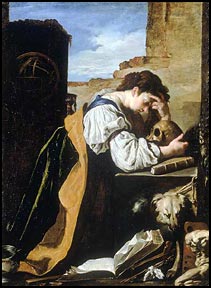|
|
|
|

Domenico Fetti. Melancholy, c1620.
from Dryden's THE INDIAN EMPEROR, 1667.
Song.
Ah fading joy! how quickly art thou past!
Yet we thy ruin haste.
As if the cares of human life were few,
We seek out new:
And follow fate, which would too fast pursue.
See, how on every bough the birds express,
In their sweet notes, their happiness.
They all enjoy, and nothing spare;
But on their mother nature lay their care:
Why then should man, the lord of all below,
Such troubles chuse to know,
As none of all his subjects undergo?
Hark, hark, the waters, fall, fall, fall,
And with a murmuring sound
Dash, dash upon the ground,
To gentle slumbers call.
|
Source:
The Works of John Dryden. 2nd ed. Vol II. Walter Scott, Ed.
London: William Miller, 1808. 348.
 |
to the works of John Dryden
|
Site copyright ©1996-2011 Anniina Jokinen. All Rights Reserved.
Page created by Anniina Jokinen on July 7, 2011.
|
|
|